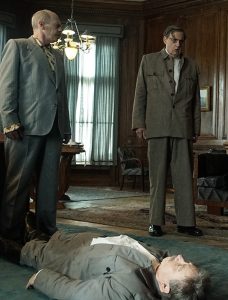‘The Death of Stalin’ offers a satirical take on history

Photo courtesy of IFC Films
Fallen leader · (From left to right) Steve Buscemi plays Nikita Krushchev,
Adrian McLoughlin plays Joseph Stalin and Jeffrey Tambor plays Georgy Malenkov.
America’s dicey political climate allows for perfect parallels to the stage of Armando Iannucci’s irreverent period satire, The Death of Stalin. Known primarily for his hit HBO television series Veep, Iannucci has a long history of biting satirical projects that reveal the ridiculousness of the political realm. The Death of Stalin is no exception to his signature style, as the film captures the events that unfold after the Soviet Union leader’s unexpected death from a brain hemorrhage. As Joseph Stalin’s presidium scrambles to fill the power vacuum that results from the death of Vladimir Lenin, the film explores the turbulent transition of power in Russia.
Iannucci leaves his farcical mark on every facet of the film. He sets the tone in the very first scene, where an audience at a Wolfgang Mozart recital is held captive so organizers can record it for Stalin with just the right amount of applause. This scene perfectly introduces the absurdity that is to come in the movie.
Since the film does not try to replicate a historically accurate depiction of the events, the director is careful to ensure that everyone in the audience, not just the history buffs, can follow the narrative. For instance, with each introduction of a character, Iannucci uses a comical motif in which the video of them entering plays in slow motion as the characters’ names appearing on the screen. These grandiose entrances, reminiscent of reality television, maintain a lightheartedness despite the horrifying nature of the history covered in the film.
The A-list actors in the cast ensure that the comedy within the film lands perfectly. The movie features a stellar performance by Steve Buscemi as Nikita Khrushchev, the conniving yet self-deprecating member of the Soviet committee. Buscemi’s comedic timing in his scenes is unparalleled, making even some of the darkest scenes easy to watch.
Jeffrey Tambor, known for his role in Arrested Development and being recently fired from Amazon’s TV series Transparent after sexual harassment allegations, plays Deputy General Secretary Georgy Malenkov, Stalin’s babbling, unqualified replacement. Tambor’s acting brings an additional layer of absurdity to the film as only a comedian can, with lines like, “kiss my Russian ass” that bring cheap laughs to the film’s depressing moments and serious political environment.
Though they play fairly minor roles in the movie, Andrea Riseborough and Rupert Friend deliver marvelous portrayals of Stalin’s children, Svetlana and Vasily, respectively. The poised Svetlana and her bratty brother make an extremely memorable duo, beautifully capturing the seemingly contrary grief and relief that accompanies their father’s death. The two siblings certainly feed off each other’s energy, bolstering their performances in the process.
Some criticize Iannucci for his choice to not incorporate Russian accents in the film. However, the unaccented acting underscores the film’s satire. It serves as a constant reminder to the audience that these are actors reconstructing and mocking history, rather than attempting to perfectly replicate the story. This theatrical element of the acting reinforces Iannucci’s satire through a self-aware embrace of the film’s inauthenticity.
Indeed, with The Death of Stalin, Iannucci proves that no period of history is too dark to be made fun of. Iannucci targets the absurdity that exists within a terrifying portion of history, and succeeds. When discussing how he handled the dark themes in an interview with TIME Magazine, Iannucci said, “The first thing I said as we started shooting was that we had to be very respectful to what happened to the people. There’s no comedy there. We just show that for real. We don’t have to comment. The comedy’s all from the senior figures inside the Kremlin.”
An extremely effective work of satire, the movie has actually been banned in Russia. In the same interview, Iannucci commented, “I knew some people would hate the idea of the film and other people would absolutely love the idea of the film, which is fair enough. That’s true of all films. Actually, from those Russians who’ve seen it, it’s been greeted positively.”
However, Russian authorities have reportedly called the film “ideological warfare,” and are unable to see the project through Iannucci’s eyes. In an age of tense political relations with Russia, especially regarding influence overseas, the inability to accept satire holds problematic implications for the future. Still, regarding the quality of The Death of Stalin, Iannucci’s unmatched ability to blend a history of tragedy with comedy delivers a fresh product that many can embrace.
